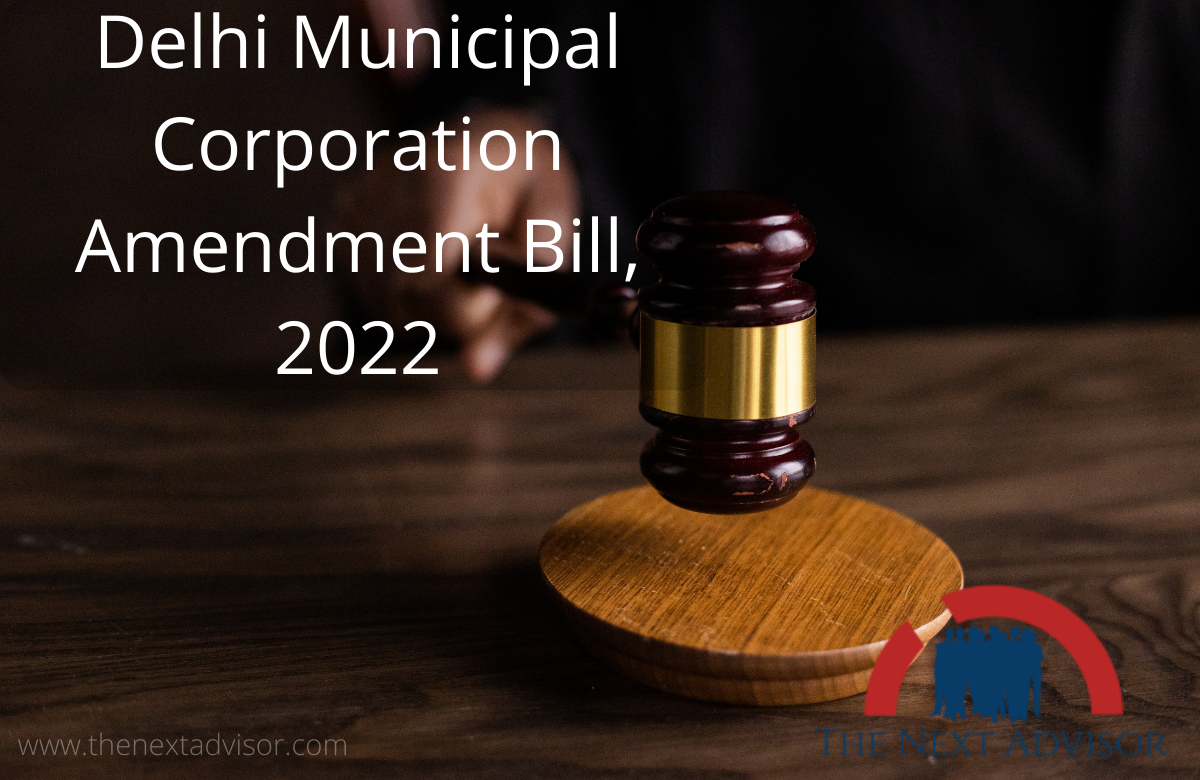Union Minister of State for Home Affairs Nityanand Rai introduced The Delhi Municipal Corporation (Amendment) Bill, 2022 in Lok Sabha to merge the three municipal corporations of the national capital into a single entity.
The Bill seeks to amend the Delhi Municipal Corporation Act, 1957, to effectively undo the earlier 2011 amendment to the Act by which the erstwhile Municipal Corporation of Delhi ( MCD ) was trifurcated into separate North, South, and East Delhi Municipal Corporations.
Background for Delhi Municipal Corporation Amendment Bill, 2022
In 2012 the Municipal Corporation of Delhi had been replaced by
• The North Delhi Municipal Corporation.
• The South Delhi Municipal Corporation.
• The East Delhi Municipal Corporation.
Need of this bill (need of Delhi Municipal Corporation Amendment Bill, 2022)
• This bill states that the 2011 trifurcation of the erstwhile Municipal Corporation of Delhi was “unequal” in terms of territorial divisions and revenue-generating potential.
• “However, trifurcation of the erstwhile Municipal Corporation of Delhi was uneven in terms of territorial divisions and revenue-generating potential. As a result, there was a huge gap in the resources available to the three corporations compared to their obligations,” the bill explains.
•This , in turn , has led to financial difficulties of the three corporations in Delhi and resulted in issues pertaining to salary payments and providing retirement benefits to employees .
•These issues led to frequent strikes by employees, impacting civil services and also creating cleanliness and sanitation issues.
What is Municipal Corporation?
•Municipal corporations are created for the administration of big cities like Delhi, Mumbai, Kolkata, Hyderabad, Bangalore, and others.
• They are established in the states by the acts of the concerned state legislatures, and in the union territories by the acts of the Parliament of India.
•There may be one common act for all the municipal corporations in a state or a separate act for each municipal corporation .
•Municipal governments rely heavily on property tax revenue to fund their operations.
•The first municipal corporation in India was created in Madras in 1688, followed by municipal corporations in Bombay and Calcutta in 1726.
•The growing population and urbanization in India’s cities necessitated the establishment of a local governing body capable of collecting property taxes and fixed grants from the state government in order to provide essential community services such as health care, education, housing, and transportation.
Constitutional Provisions
In the Constitution of India, no provision was made for the establishment of local self – government, except the incorporation of Article 40 in the Directive Principles of State Policy.
• The 74th Amendment Act, 1992 has inserted a new Part IX-A into the Constitution which deals with the administration of Municipalities and Nagar Palikas.
• It consists of Articles 243P to 243ZG. It also added a new twelfth schedule to the Constitution. The 12th schedule consists of 18 items.
About the Delhi Municipal Corporation Amendment Bill, 2022
• The Bill, when passed, will not return the MCD exactly to its pre – 2011 situation. There are sections in the Bill that will make the new MCD very different from the older one.
• The number of seats in the MCD house is proposed to be capped at 250, and the final number will be decided by the central government at the time of the establishment of the corporation.
• At present, there are 272 elected councilors in the three corporations together. This was the number even before the trifurcation.
•Reducing the number of seats means a new delimitation exercise will have to be conducted, which experts say will take at least three months, but is more likely to take six months. If that happens, the MCD elections, which were scheduled to be held in April according to the State Election Commission, will be considerably delayed.
•Among the most important provisions of the Bill is one that allows the Center to appoint a Special Officer until the first meeting of the unified MCD takes place. This means that until the elections are concluded, the Center will likely appoint an officer to run the corporation.
” Notwithstanding anything contained in this Act, the Central Government may, if necessary, appoint a person to be called the Special Officer, to exercise the power and discharge the functions of the Corporation until the date on which the first meeting of the Corporation is held after the commencement of the Delhi Municipal Corporation (Amendment) Act, 2022, ” says the Bill.
•The other significant change is the replacement of the word ” government ” with ” Central government ” in all places. This basically takes the Delhi government out of the picture completely when it comes to decision-making in the unified corporation.
What the Delhi government loses
•According to a Bill Summary prepared by PRS Legislative Research, the 2011amendment marked out areas where the Delhi government would have the power to make decisions.
• These included the number of seats reserved for Scheduled Castes in the corporation, the division of the area of corporations into zones and wards, the delimitation of wards, salary, and allowances, and leave of absence of the Commissioner.
• In the existing situation, the ” Commissioner will exercise his powers regarding building regulations under the general superintendence and directions of Delhi government, ” the PRS summary says.
•The Bill instead empowers the central government to decide all these matters.
• The Bill also does away with the provision of appointing a Director of Local Bodies by the Delhi government. The role of the local bodies director is to monitor cooperation among the corporations and to track the collection and sharing of toll tax.

























